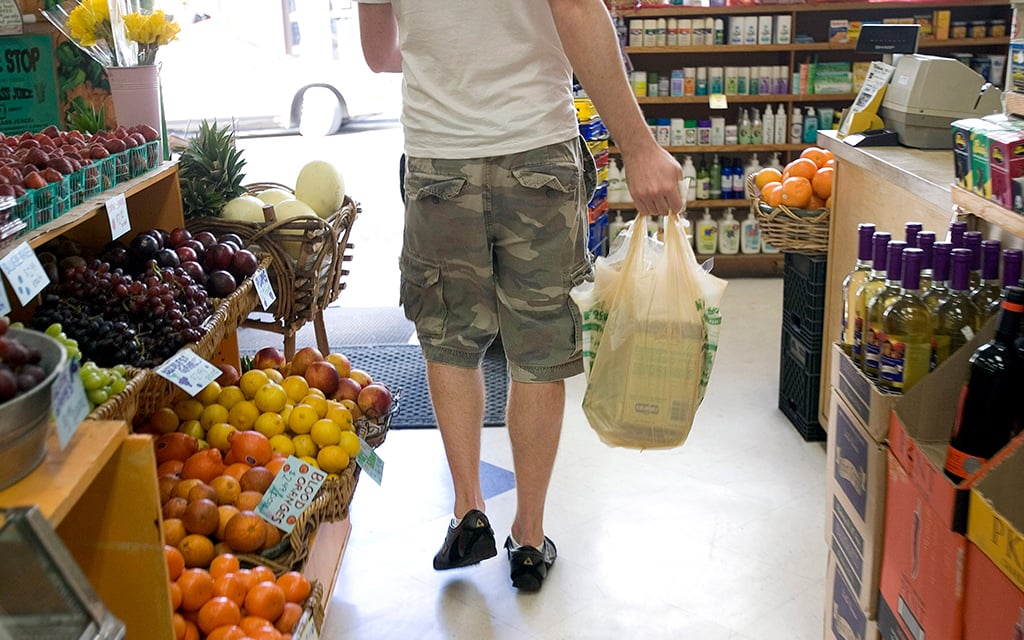LOS ANGELES – California is taking climate-saving efforts to the next level with a full ban on plastic bags and a state lawsuit against natural gas giant ExxonMobil.
Gov. Gavin Newsom approved new legislation Sunday prohibiting stores from providing plastic bags starting in 2026.
Senate Bill 1053 replaces 2014 legislation that prohibited stores from providing customers with “single-use carryout bags” that left room for thicker, multi use plastic bags.
Though the thicker plastic allowed for more use out of one bag, it didn’t decrease the number of shopping bags thrown out. Comparisons of CalRecycle’s yearly reports revealed the weight of plastic grocery and merchandise bags found in California landfills had climbed about 80% between 2014 and 2021.
The American Recyclable Plastic Bag Alliance, a lobbying group for plastic bag manufacturers and recyclers, and fights for reusable plastics rather than banning or taxing plastic bags. It instead advocates for existing recycling programs, provides education on proper recycling habits and supports public policy that promotes recycling.
ARPBA does not support California’s bag ban.
“While bans will eliminate plastic carryout bags from the marketplace, forcing stores and shoppers to switch to alternative products with greater environmental impacts that are rarely reused enough to be more sustainable will not help our shared environment,” the organization said on its website.
In addition to public policy changes that aim to reduce plastic waste, California is suing natural gas and chemical giant ExxonMobil over its recycling processes.
California Attorney General Rob Bonta announced the lawsuit Sunday, claiming the company allegedly created a “campaign of deception” regarding plastic reduction and recycling.
“For decades, ExxonMobil has been deceiving the public to convince us that plastic recycling could solve the plastic waste and pollution crisis when they clearly knew this wasn’t possible,” Bonta said in a statement. “ExxonMobil lied to further its record-breaking profits at the expense of our planet and possibly jeopardizing our health.”
According to the attorney general’s complaint, the company’s use of the chasing arrows recycle symbol found on plastics led consumers to believe that any products with the logo would be recycled into new plastic – which is not the case.
The number, or “code,” found in the logo is associated with the resin type used in the item, which then determines the chemical process needed to recycle it. What many don’t know is that recycle codes three through seven are more difficult to break down, and often aren’t recycled, despite the fact that companies accept them.
As of 2021, only about 5% to 6% of plastic waste in the U.S. is recycled into another plastic product, according to a report from Beyond Plastics, a project based at Bennington College in Vermont.
The complaint also cited the company’s misuse of the umbrella term “advanced recycling,” also known as chemical recycling – a process that breaks down plastic waste into chemical building blocks for plastic manufacturing among other uses.
“Advanced recycling works,” said Kelly Davila, an ExxonMobil spokesperson, said in a statement. “To date, we’ve processed more than 60 million pounds of plastic waste into usable raw materials, keeping it out of landfills.”
Climate nonprofits, including the Sierra Club and Surfrider Foundation, have filed their own lawsuit against ExxonMobil claiming public deception and contribution to plastic pollution.
“Plastic pollution has risen to be one of the defining environmental issues of our time,” Allison Chin, the Sierra Club’s Board of Directors president, said in a statement. “If we’re going to clean up the mountains of plastic waste, Exxon needs to clean up its act.”

